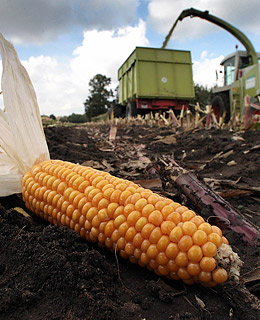
U.S. agriculture policy is a jumble, but the basic goal is simple: redistribute money to big commodity farmers. The median farmer's net worth is five times the median American's, and the top one-tenth of farmers get three-fourths of the subsidies. It's a welfare program for the megafarms that use the most fuel, water and pesticides; emit the most greenhouse gases; grow the most fattening crops; hire the most illegals; and depopulate rural America.
Antiobesity, antipoverty, free-trade, balanced-budget and environmental activists have clamored for reform, but nobody works farm policy harder than the farm lobby, and farm-state politicians — including Obama — have protected the status quo. Still, Obama's agri-pandering didn't win him the Farm Bureau endorsement, even though McCain opposed farm giveaways. And Obama has suggested that he's open to more sensible policies that would promote less energy-intensive agriculture.
How about repealing the $307 billion farm bill and slashing subsidies — especially the for-no-apparent-reason "direct payments" we send to commodity farmers in good times and bad. Farm lobbyists will squeal, but 60% of U.S. farmers receive no subsidies. Instead, Obama can increase conservation subsidies for farmers who adopt green practices. He should also repeal the counterproductive mandates that will require the production of 36 billion gal. (136 billion L) of biofuels by 2022. Biofuels like corn ethanol sound great, and Obama supports them, but they accelerate global warming because shifting production from food to fuel leads to massive emissions from deforestation when farmers expand to grow more food. The biofuel boom is also jacking up the price of grain, which is increasing food prices and triggering food riots in countries like Yemen, Haiti and Pakistan.
The farm lobby and its water carriers in Congress are long overdue for a smackdown. But sensible farm policies could still include goodies for farmers. For example, Obama should ditch the preposterous ban on subsidized farmers' growing healthy fruits and vegetables. He should expand purchases for the successful school-lunch program while shifting the menus away from fattening crud. And he can expand markets for farmers and other American exporters by ending the humiliatingly futile Cuban embargo, which has been forcing the Castros out of power for 46 years now.